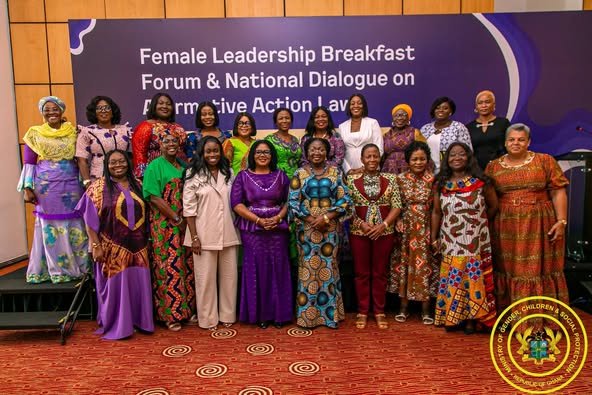News
Minister participates in national dialogue on affirmative action and female leadership

The Minister for Gender, Children and Social Protection,Dr. Agnes Naa Momo Lartey, participated in the National Dialogue on Affirmative Action and Breakfast Forum held on March 28,2025, an Initiative by Glitz Africa Magazine.
The event, themed “Strengthening Female Leadership and Policy Influence,” brought together high-level female leaders and policy influencers from Ghana and beyond to discuss practical ways of enhancing women’s participation in leadership and governance.
Speaking at the forum, the Minister described the conversation as both timely and necessary, especially in the wake of Ghana’s recent passage of the Affirmative Action (Gender Equity) Act, 2024 (Act 1121).
She noted that the law, passed after nearly two decades of advocacy, is not just a document but a national commitment to ensuring that women are no longer underrepresented or unheard in decision-making spaces.
She shared key highlights from her recent participation in the ECOWAS High-Level Interactive Session during the 69th Session of the Commission on the Status of Women (CSW69) in New York, where it was revealed that at the current global pace, it could take over 100 years to bridge the gender gap.
Dr. Agnes Naa Momo Lartey expressed optimism that platforms like the National Dialogue, which bring together seasoned leaders and emerging changemakers, have the potential to accelerate progress and reduce that timeline significantly.
In outlining Ghana’s steps toward implementing the Affirmative Action Act, she disclosed that H.E. John Dramani Mahama’s Government, through the Ministry of Gender, is finalizing the Legislative Instrument to support enforcement of the law, establishing a Gender Equity Committee to oversee compliance, and working towards meeting the 30% minimum quota for women in all political appointments.
The Minister further called for a collective national effort to strengthen female leadership through institutional commitment, intergenerational mentorship, and strong accountability mechanisms to ensure that the law does not remain on paper.
She emphasized that leadership should not be defined by gender, but by competence, vision, and inclusivity.
The Minister concluded her remarks with a call to action, urging all stakeholders to push for more women in leadership, challenge societal biases, and work toward achieving full gender parity in policy-making.
News
Prioritise affordable treatment of sickle cell treatment —Health Expert

Health experts have urged Ghana to prioritise affordable and accessible treatment for sickle cell disease (SCD) as advanced, but costly curative therapies remain out of reach.
SCD, an inherited blood disorder, affects about three in every 100 newborns in Ghana.
Globally, around 1,000 babies are born with the condition daily, with three-quarters in sub-Saharan Africa.
The disease causes severe complications including chronic pain, anaemia, infections, strokes and organ damage, often leading to shortened life expectancy.
In recent years, gene therapy has been developed as a potential cure.
However, its cost—running into millions of dollars per patient—makes it financially and technically inaccessible in Ghana.
According to Dr Lawrence Osei-Tutu, a Sickle Cell and Childhood Cancer Expert at the Komfo Anokye Teaching Hospital, “the country must instead focus on practical, lower-cost interventions such as hydroxyurea”, a decades-old cancer drug proven to reduce painful episodes, hospitalisation and life- threatening complications in SCD patients”.
Taken orally, the medicine improves red blood cell function and is considered safe and effective.
“Hydroxyurea therapy is as good as the cure and a low-hanging fruit to pluck, we must bring a cure to our sickle cell warriors, but do so sustainably.” he urged.
In a chat with The Spectator here, he said to create awareness on the disease, the expert noted that despite its benefits, “hydroxyurea is not widely accessible in Ghana.”
Stressing that, “many patients either cannot afford it or struggle with irregular supply through the health system.”
Moreover, he argued that scaling up access would provide immediate relief while the country builds the infrastructure, trains specialists and secures funding needed to support curative therapies in the future.
With an estimated 15,000 babies born with sickle cell disease annually in Ghana, Dr Osei Tutu cautioned that “failure to improve access to effective treatment will leave many patients vulnerable to preventable complications and early death.”
From Kingsley E. Hope, Kumasi
Join our WhatsApp Channel now!
https://whatsapp.com/channel/0029VbBElzjInlqHhl1aTU27
Hot!
Let’s reintroduce Cultural Studies to complement educational reforms — Tourism Minister

Madam Abla Dzifa Gomashie, the Minister of Tourism, Culture and Creative Arts, has emphasised the importance of reintroducing Cultural Studies in schools as part of Ghana’s broader educational reform agenda.
She said Cultural Studies would complement existing efforts to reposition Science, Technology, Engineering and Mathematics (STEM) and Technical Vocational Education and Training (TVET) to promote digital literacy and expand Creative Arts education.
Speaking at the 2025 Homowo Festival of the people of Ningo-Prampram, held on the theme: “Education: The Best Legacy for our Children,” Madam Gomashie said cultural education was critical to national identity and development.
She noted that the festival’s theme aligned with the Government’s vision to transform education in Ghana and encouraged the youth to embrace it not only as a means of personal development but also as a way of preserving traditional values.
These values, including patience, wisdom, and hard work, were at the core of the Homowo celebration, the Minister said.
“Cultural festivals like Homowo are vital instruments for strengthening cultural identity, preserving historical memory, and fostering national unity. Additionally, festivals serve as platforms for educating the youth through storytelling, music, dance, and other traditional practices, while also providing opportunities for community engagement.”
Madam Gomashie highlighted the strong foundation that Ghana’s tourism was built on, which included culture, traditions, and the creative industry, collectively contributing to over GH¢4.8 billion to the economy.
“Festivals give tourists reasons to visit our country. Therefore, with the right infrastructure and the development of all the domains, the sector can do more than what has been recorded,” she added.
Mr Sam Nartey George, the Member of Parliament for Ningo-Prampram and Minister of Communication, Digital Technology and Innovation, commended the community for their vibrant participation in the festival. He announced plans for the construction of a new nursing training school in Ningo, aimed at expanding access to healthcare education in the area.
Nene Osroagbo Djangmah XII, Paramount Chief of Great Ningo Traditional Area; King Dr Tackie Teiko Tsuru II, Ga Mantse; Nene Tetteh Wakah III, Paramount Chief of the Prampram Traditional Area; Prof. Odaifio Welentsi III, Paramount Chief of the Nungua Traditional Area; Naana Dugbakuwor Dugba II, Paramount Queen Mother of Great Ningo; and Mr. Elvis Afriyie Ankrah, Special Envoy on Religion and Inter-Faith Affairs, who represented the Chief of Staff, were among dignitaries at the festival. -GNA














